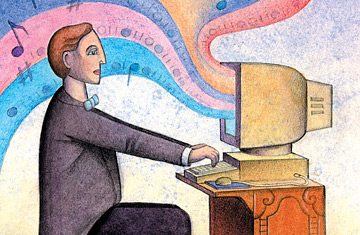
This past Tuesday, thousands of Internet radio stations found the perfect way to make their point about a recent decision to raise the royalty rates they pay — they simply shut down as part of what they called the "Day of Silence" protest. If the new rules go into effect as planned on July 15, the webcasters claim, there will no longer be niche streams like "Screamin' and Hollerin,'" "Ninja Tunes" or "The Cole Porter Songbook"--just three of the 320 channels available to listeners of AccuRadio, which is itself one of a legion of large, small, and miniscule providers of free streaming music. Supporters of the increase want to see struggling artists receive the money they say they deserve, and argue that the rules that were set up for a fledgling industry five years ago are no longer appropriate in an era when at least some of the stations are now owned by large corporations such as Yahoo!, AOL or RealNetworks.
Both sides had their say at a Thursday morning House Small Business Committee hearing. "If we have to pay those fees, we'd be bankrupted the day we had to write the first check," AccuRadio CEO Kurt Hanson said. "And this is all very ironic because Internet radio is one of the best things that has happened to the music industry in the last decade... It's given voice to genres and artists that have never gotten airplay before." Indeed, most music released every year is never heard on terrestrial AM and FM radio, with most songs on corporate-owned stations coming from Top-40 and other similar blockbuster acts. As a result, over the past five years Internet radio listenership has grown to almost 30 million, said Ohio Rep. Steve Chabot, the ranking Republican member on the Small Business Committee.
The spirited debate stems from the new rules set out by the Corporate Royalty Board this March. Previously, under a bill approved five years ago by Congress, small webcasters paid out royalty fees relative to their own revenues. Larger profits meant larger payments. But starting July 15, webcasters would be forced to pay increased flat rates (retroactive to the beginning of 2006) over the next three years for every performance of every song played on their streams. Additionally, each Internet radio station would have to pay a $500 fee per channel to SoundExchange, the organization that collects royalty fees, a provision that opponents say would be disastrous to companies who use the Internet's virtually unlimited space to create hundreds upon hundreds of very specific music channels.
Rep. Jay Inslee, a Washington Democrat, has introduced a bill that would effectively overturn the CRB royalty rate increase. House Small Business Committee Chair Nydia Velaquez, a New York Democrat, however, maintained that the answer to this dilemma should not be found in Congress and that the parties should try to reach a compromise. SoundExchange, for its part, says that it has offered small webcasters (those with revenues of under $1.2 million) a subsidy that would extend the current, revenue-based agreement until 2010. Yet webcasters, still hoping for a more beneficial outcome, have also petitioned the DC Circuit Court of Appeals for a stay of the rate increase.
Country singer/songwriter Joey Allcorn is one of the rate increase's opponents, and he attributes his modest success to the growth of Internet radio. A practitioner of a throwback country style, Allcorn does not have the support of a major label or the means to try to get his music on "mainstream" country radio stations. "When we made the Ram Radio top ten list of 2006, people would come up to me at shows and say 'I bought your album on the Internet after hearing your music on Last.fm or Pandora' or many other of these services," Allcorn said, referring to several webcasters. "I like getting paid and I like royalty payments," Allcorn said. "But if the only radio that plays my music goes bankrupt, they won't be playing my music or paying me royalties."
Yet Grammy winner Cathy Fink, who counts herself in an even more radio-unfriendly genre — children's music — offered a feisty counterpoint to Allcorn, insisting and re-insisting that she deserved to be fairly paid for her work. She pays for her own instruments, her own recording sessions, and her own health insurance, so why shouldn't she be fully compensated? She expressed little sympathy for webcasters and their plight. "There's all this talk that not all Internet radio companies are going to survive, but that's true with all businesses," Fink said. "Not every bicycle company survives. Not every inventor comes up with something that survives the marketplace."
